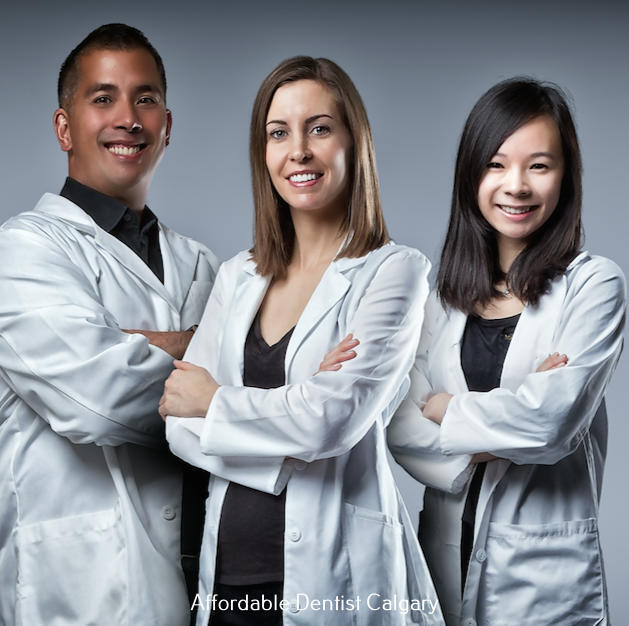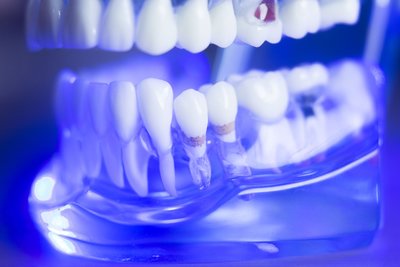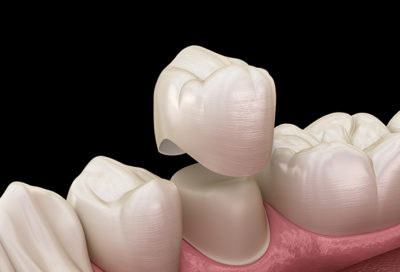Dental Implants in Calgary | Macleod Trail Dental
Book Your Consultation

What are dental implants?
Dental implants are essentially a titanium post in place of your tooth’s root acting as a foundation for replacement teeth. The titanium is made from a biocompatible material that helps keep the implant secure in your jaw bone.
Today, dental implants are considered a more sustainable solution than dentures or bridges! Generally speaking, dental implants have a 98% success rate!
Benefits Of Dental Implants
- The implanted teeth will look and feel like your original oral structure, giving you greater confidence.
- You’ll be able to speak normally since the permanent dentures will remain in place without moving around.
- Dental inserts last a long time, as long as you maintain proper dental hygiene!
- Implants preserve the structure, alignment, and integrity of the other teeth in the mouth.
- They help prevent further bone loss.
- Titanium is metal and cannot decay like regular teeth.
- It will be easier to eat and enjoy food again.
- Implants can eliminate or reduce oral pain.
Better yet, dental implants are more durable and convenient than dentures or other replacement teeth solutions. Studies show that implants can last as long as 25 years!

Am I a good candidate for dental implants?
Ideal candidates for dental implants should have healthy gums and a strong jawbone to hold the implant. Dental implants offer an excellent solution for missing teeth caused by decay, injury, teeth grinding, or oral diseases. When evaluating someone as a good candidate for dental implants, our Calgary dentist keeps the following factors in mind:
- Number of dental implants needed
- Maturity of the bone structure (you’ll need to have a fully-developed jawbone)
- The overall health of the oral tissue (your other teeth, particularly the neighbouring teeth, should be free of decay)
- Adequate bone to hold the tooth inserts or bone grafts in place
- Any health conditions that can affect the healing process after the dental implants procedure
- Whether or not you smoke (smoking delays healing, so the dentist may not recommend surgery)
- Ability to commit 6 to 8 months to the process (you’ll need to come in for regular checkups so the doctor can make sure you’re healing as expected)
- Any prescriptions, medications, or over-the-counter supplements you take regularly
- The location of the implant (it shouldn’t be too close to the sinus cavity or nerves)
What can I expect from the dental implants procedure?
The first step to the dental implant procedure is to talk with your dentist and find out if it’s a viable solution. At this initial appointment, you will discuss the procedure in full detail following a complete examination of your mouth and teeth. The shortest time frame for a single dental implant is five months in the lower jaw and six months in the upper jaw.
In some cases, you may undergo a one-stage procedure where the dentist places the implant, abutment (the connecting structure holding the crown securely to the implanted post), and crown in one sitting. The good news is that dental implants don’t require any preparation for your neighbouring healthy teeth! To reduce discomfort, you’ll receive local anesthesia during the procedure.
The typical dental implant procedure includes the following — to reduce discomfort, you’ll receive local anesthesia during each procedure:
First Dental Implant Procedure
The dentist will make an incision in the gums where the implant will attach. Next, they drill a hole in the bone for the implant to rest before sewing up the incision. As the jawbone heals, it grows around the implant. This helps secure the replacement tooth. Typically, the healing process ranges from three to six months.
Second Dental Implant Procedure
Once the jaw is healed and the implant is firmly in place, the dentist makes a new incision. From there, the abutment is placed on top of the implant to help the surrounding gum tissue heal and secure your new replacement tooth. The dentist may also take impressions of your teeth to create a tooth that matches your bite. Lastly, the replacement tooth (crown) is attached to the abutment.
Missing one, a few, or all of your teeth?
Dental implants can give you the new smile you want!
Book Your Free ConsultationDental Implant Care & Recovery
After the dental implant procedure, you may experience mild discomfort and soreness. Pain medication is commonly used to treat these side effects. In addition, you may need a night guard to further protect your new tooth replacement.
It’s important to take good care of your new dental implants following the procedure. A simple way to put it is to treat them the same way you treat your natural teeth! That includes:
- Brushing
- Flossing
- Visiting the dentist every 6 months for a teeth cleaning and check-up
FAQs
The cost of dental implants doesn’t necessarily depend on how many teeth are missing, but on the number of implants needed to support single or multi-tooth restorations.
For instance, maybe you need to replace all of your upper teeth at one time. Our Calgary implant dentist might recommend four implants placed in strategic points of your arch, and then a full-arch prosthesis such as a hybrid denture (extended bridge) on top of them.
In another situation, you might have 3-4 missing teeth in a row but want to avoid wearing a partial denture. Getting implants would be more expensive initially, but since they last for so long, they offer the best return on investment. And you wouldn’t need an implant for each tooth that’s missing. Rather, we would just install an implant at each end of the space and then affix a multi-tooth dental bridge on top of them.
Knowing how many dental implants you need in total, added to the cost of the fixed prosthesis, plus any adjunctive services (such as bone grafts or X-rays) will determine the full price of treatment.
Since the cost varies greatly from person to person, a consultation is necessary.
Surprisingly to most people, getting dental implants is more comfortable than they ever realized. Since the bone in your mouth where the implant is installed doesn’t have pain receptors, you’ll only feel some minor irritation at the site of the opening in your gums. Fortunately, this heals quite quickly! Most people say that getting dental implants is easier and more comfortable than having a tooth pulled.
Dental implant placement is a type of minor oral surgery, but it’s minimally invasive enough that all our dentist needs to do is apply a small amount of local anesthetic. Once the placement site is thoroughly numbed, we can make a small incision in your gums and install the implant directly into the bone.
If you’re still nervous about getting implants – even as easy as they are – you can request sedation dentistry to help you relax even more! Sedatives ease your anxiety level so that you’ll feel relaxed. As an added bonus, we’ll be able to work more efficiently. Ask if sedation is right for you!
Absolutely, dental implants are safe! There are several advantages to dental implants that make them the best solution for missing tooth replacement:
- First, implants trigger a process called “osseointegration” which is where a new layer of bone forms around them and fuses the implant permanently into place. This process makes implants predictable and is beneficial to your future oral health. With healthier bone you can reduce shrinkage in areas of tooth loss, further supporting a youthful facial profile.
- Second, implants are made of biocompatible materials. So, there isn’t a significant chance of any type of allergic reaction or failure after the procedure is completed. In addition to titanium, implants are also available in ceramic.
- Thirdly, implants are stronger than healthy teeth. It’s possible for our Calgary implant dentist to use pairs of implants to support multi-tooth restorations.
- Finally, implants are non-invasive to your adjacent teeth. When they’re installed, they don’t require reshaping the neighbouring teeth to help reinforce your implant restoration. Rather, the new implant helps maintain the natural tooth positioning and avoids any negative impact on healthy teeth on either side.
From the initial consultation appointment to your final restoration placement, it may be anywhere from 6-12 months in total. However, dental implant installation is a complex process with several different considerations to keep in mind. The actual dental implant installation itself usually only requires one appointment to complete. In most cases, the procedure takes under an hour from start to finish. This phase of the implant procedure is just the placement of the implant “root” that sets down into the bone.
However, your new implant needs time to integrate with the bone before it’s strong enough to support a fixed restoration. This could be anywhere from 3-6 months after the initial placement appointment. In the meantime, you’ll probably wear something called a “healing abutment” or a temporary restoration in that area, so that it doesn’t appear as if you have a missing tooth.
Once fully integrated, we’ll fit you with a special abutment on top of the implant and then take an impression for a permanent crown/bridge/denture, which is usually delivered within the next few weeks.
The metal that is used in most dental implants is titanium. Titanium is a hypoallergenic material and extremely friendly to the body. It was first discovered several decades ago and has since been used in medical procedures such as joint replacement with tremendous success.
But even though titanium is naturally accepted by the body, there are even bigger benefits of using it inside of the mouth. For one, it’s stronger than the natural tooth structure. So, when our Calgary implant dentist needs to replace several teeth at one time, we can use pairs or sets of implants to support multi-tooth restorations in lieu of installing an implant at the site of every missing tooth.
The other advantage of using titanium is that it triggers osseointegration within the bone, so when your bone cells come into contact with it, they’re stimulated to generate new bone cells. The bone cells then build a connection between your jaw and the implant surface. When full osseointegration occurs, it’s highly unlikely that your dental implant will ever come out.
You might be surprised to learn that you don’t necessarily need an implant for each missing tooth. If you need to replace all of your upper teeth, for instance, it might be possible to use as few as four implants total. Or if you only need a few replaced, we might anchor a bridge on top of two implants.
However, if you have individual teeth that need to be replaced but they’re located between two healthy teeth, you will need an independent implant and crown in each of those locations. So, in theory, you could have more than four implants in your upper or lower arch.
Visiting with our implant dentist in Calgary will give you an opportunity to learn more about the options that are available for your unique circumstances. From there, we can weigh various scenarios to determine the best solution for your oral health. You’ll get the chance to play a key role in co-planning the next steps for restoring your smile. Chances are, you’ll have more choices than you realized.
It depends on the extent of bone loss and the location of the implant. In some cases, we can perform bone augmentation, where grafting is used to build up the area and add a better foundation for future implants to be installed. In other instances, 3D imaging can be used to digitally place the implant at various angles or positions to determine what alternatives are available.
When we’re dealing with a smaller area such as a lower front tooth, there are alternatives like mini dental implants which might be worth considering. However, mini implants aren’t designed for heavy load-bearing areas because of their smaller size.
Fortunately, dental implant treatments are quite a predictable process. With the right resources and imaging techniques, we can make implant therapy a viable option for more people than ever before.
If you’ve been told in the past that dental implants aren’t an option for you because of bone loss, it’s worth getting a second opinion with our Calgary dentist! Newer technology and resources may have changed the scenario for your smile.
Today’s modern dental implants have the potential to last your entire life! In fact, they’re regarded as the standard of care for the replacement of missing teeth. Compared to implants from decades ago, today’s designs mimic the anatomy of a natural tooth.
The key to getting your dental implants to last forever is to treat them like natural teeth. You’ll need to brush and floss them daily, paying particular attention to the gums around them. Also be sure to schedule regular exams and cleanings to have them maintained and evaluated.
Peri-implantitis (an implant form of gum disease) is the leading cause of implant failure. However, it can be prevented with good oral hygiene. Even though implants do not get cavities, it’s crucial to keep them extremely clean.
All of that being said, the restoration on top of your dental implant (such as the crown, bridge, or denture) may need to be routinely updated as they start to wear out. That might be anywhere from every 5-15 years or so, depending on the individual.
An implant dentist is best qualified to do dental implants. An implant dentist can be any dentist who is trained and experienced in implant therapy. Some specialists such as oral surgeons and periodontists also offer this service if the general dentist is not equipped to perform the procedure in their office.
If you’re looking for an implant dentist, it can help to ask how many cases the dentist has completed and what type of professional development courses they’ve taken on the service. Although most dentists are licensed to provide implants in their practice, it’s a procedure that some elect to refer elsewhere.
Depending on which type of dental implants you want, how many you need, and if there are extenuating circumstances (such as bone loss or health issues) you will probably want to see the most experienced implant dentist in your area to ensure a successful outcome.
If you’re searching for the best dental implant dentist in Calgary, ask your current oral health provider’s office if they offer the service or can recommend an experienced provider who does.
As mentioned above, you should set up a comprehensive dental exam to discuss the overall procedure with your dentist — don’t be afraid to ask questions! For example, ask what is the length of the procedure? Or, how about recovery time and care of replacement tooth? Your dentist will be more than happy to answer all your questions.
Depending on your situation, you may need to take into account the condition of your jawbone. This may require a visit to an oral and maxillofacial surgeon. Again, a visit with your general dentist will help you determine how to prepare for surgery.
While the dental implants procedure is typically safe, there is some degree of risk involved. These risks can include:
- Infection or delayed healing at the implant site. Coming in for regular appointments and checkups allows the dentist to monitor the tissue healing.
- Injury to the gum tissues or blood vessels around the surgery site. Our dentist will take scans to map out the location of the vessels and take precautions to avoid them.
- Damage to the nerves because of which you may sense numbness, tingling, or pain. This discomfort may extend to the tongue, lips, chin, and original teeth. The pre-procedure scans will help our dentist avoid the nerves.
- Possibility of an injury to the sinus cavities in case the implant rod sticks through the upper jaw. This is rare!
There aren’t necessarily different types of dental implants, but they can be used to support a variety of dental solutions depending on your unique issues. Dental implants can be used to replace a single tooth or several teeth with an implant-retained bridge or partial denture. Implants can even be used to replace all of your teeth by retaining an entire denture.

About The Caring Dentists of Macleod Trail Dental
Our dentists use their expertise in general and cosmetic dentistry to provide the best, most caring care possible. They love answering dental questions and finding the right solutions for all of our patients. If you need a new dentist in SW Calgary that you can trust, Macleod Trail Dental is here to help!
About UsRelated Services
Smile Makeover
Complete your smile with a customized plan of our different dental restoration treatments.
Cleanings & Checkups
Get a brighter, healthier smile with regular dental cleanings and check-ups.
Dental Crown
Restore your teeth back to their natural strength, look, and feel with dental crowns!
Don’t wait in pain
Get started with the trusted dentist Calgary patients recommend.
Call us at (403) 253-1248 or use our online booking form to schedule your visit.
Your smile starts here—at Macleod Trail Dental.
Book An Appointment



